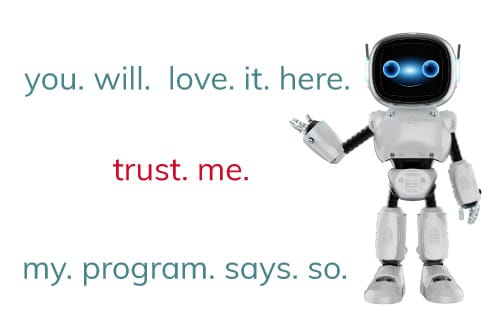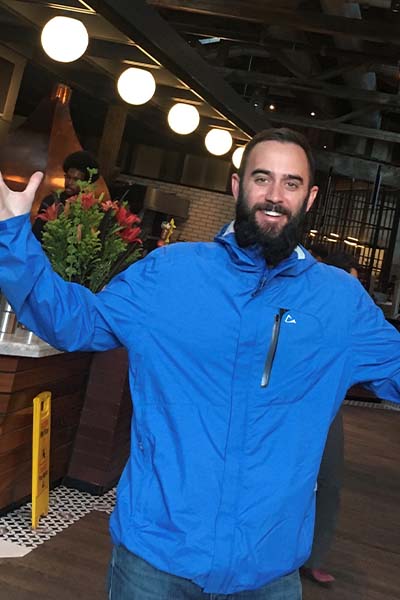
The successful use of artificial intelligence (AI) in tourism marketing rests on one key factor: secrecy. Not secrecy from your colleagues or organization…secrecy from your audience. You need your use of AI to be invisible to them for two main reasons:
- Blatantly apparent AI-generated copy is generic and robotic-sounding. And even if it were written by a human, that kind of soulless, impersonal copy doesn’t engage the audience and wastes your time and budget. The rest of your marketing will have to work that much harder to spark a sale, let alone close one.
- If they sense you’re using AI to influence their decisions – and done incorrectly, they will – you’ll lose their trust. People are increasingly sniffing out AI-generated copy and then doubting its credibility. Humanity just hasn’t yet reached the point where we’re comfortable being persuaded to do something by a robot.
Let me be crystal clear. Using AI in tourism marketing is smart. Tools like ChatGPT and Google’s Bard can be useful in many ways. But YOU have to be smart in how you use them. Until you become proficient in prompting and re-prompting to produce successful output, you are at risk for – essentially – sending out a stoic, unfeeling salesperson to promote your offerings.
And that won’t end well for you.
As a tourism marketer, you’re trying to sell potential guests an experience that makes (hopefully) everlasting memories and creates (hopefully) a lifetime relationship with them. Robotic-sounding, generic marketing copy is incapable of igniting the spark required for that love affair. And when used incorrectly, that’s EXACTLY how AI-generated copy sounds…like a robot wrote it.
To guard against this, you need to be aware of six telltale signs that content was written by AI.
Jodie Cook wrote a fantastic piece for Forbes on the subject, calling out these six dead giveaways:
- Lengthy introductions (aka “throat clearing”)
- Inclusion of ethical considerations
- Generic thoughts and advice
- Lack of personal stories
- Specific go-to phrases
- Signature structure
You can read the piece for more information on all six, but the three most prevalent ones in tourism marketing are lengthy introductions, generic thoughts/advice, and lack of personal stories. Let’s take a look.
Lengthy Introductions
I call this the “blah blah blah” introduction and AI is famous for churning it out. A rudimentary AI-generated piece, like that of many unskilled human writers, puts a bunch of fluff at the start and takes a bit of time to get to the meat of the content. Often it includes clichés (“Once you arrive, you’ll never want to leave!”), or broad-sweeping statements that mean nothing in particular (“Come experience the magic of the outdoors!”). It’s usually filled with a lot of long sentences and densely packed with a quantity of adjectives that would make a thesaurus blush. This is the written version of speakers who begin their presentation with excessive throat-clearing…it’s buying them time to get into the rhythm of their speech.
Generic Thoughts & Advice
OMG, if I see one more tourism organization proclaim “We have something for everyone!”… I’m going to scream. Even if you truly DO have something for everyone to enjoy, that sort of vanilla claim has zero chance of actually luring a potential visitor. Without specific prompting and sculpting on your part, AI programs like ChatGPT are likely to generate generic content like “breathe the fresh air as you wander through our beautiful forests,” and “hop on a boat to get out and feel the ocean mist on your face as you watch an orange-hued sunset,” and “sip and taste your way through our vibrant dining scene,” and – my personal favorite – “come away with memories that will last a lifetime.” None of that is specific and unique to YOU, so why should it compel anyone to choose YOU? It’s just…uninspiring.
Lack of Personal Stories
First cousin to “generic thoughts & advice,” a lack of personal stories isn’t meant so literally as in “a person telling a story about their experience with you.” That’s part of it, for sure. But on a broader level, it’s about your BRAND making a personal connection with the audience. Doesn’t matter if you’re a destination, hotel, cruise line, attraction, or even just a travel service…whatever. Sharing your quirks, your variety of unique Instagram-worthy experiences, and other stories that inspire them to feel a personal connection to you… THAT’S essential in successful tourism marketing. And it’s something you won’t get from AI-generated content without training it to write that way. It lacks the ability to do that on its own because by default, its process delivers one-size-fits-all content that’s impersonal.
And that right there is the problem. In the world of tourism, people are choosing where to spend their precious time and money, and this is VERY personal to them. Tourism is a passionate and deeply engaging purchase decision that goes way beyond transactional. They may not care if a robot wrote their appliance user’s manual (which is simply delivering information), but they sure as hell want – say – their honeymoon suggestions (which requires the dance of persuasion and has a lot riding on the outcome) to come from a credible source.
Which brings us to the best news of all, and a hilarious silver lining for tourism marketers. A brand is now no longer the LEAST credible source for promoting its own offerings. The “credible believability” pecking order currently stands like this, from most believable to least believable:
- Someone I trust.
- Someone I know casually.
- A stranger unaffiliated with the product/service, which could be a media outlet or a random person on social media.
- The organization itself.
- A robot.
Y’all, we’ve moved up a notch. So don’t squander that gift by making it obvious you’re using AI in tourism marketing. Make that your little secret.
Not sure how to get started doing this properly? Check out these ChatGPT tips for tourism marketers.
Feel like you suck at writing and so you can’t properly judge AI’s output? These two quick reads will help you:
 get travel marketing tips
get travel marketing tips 




